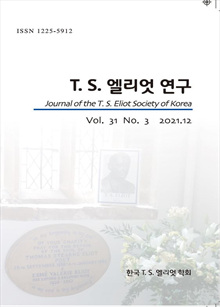간행물
T.S.엘리엇연구 KCI 등재 Journal of the T. S. Eliot Society of Korea

- 발행기관 한국T.S.엘리엇학회
- 자료유형 학술지
- 간기 연3회
- ISSN 1225-5912 (Print)2765-6322 (Online)
- 수록기간 1993 ~ 2023
- 주제분류 인문학 > 영어와문학 인문학 분류의 다른 간행물
- 십진분류KDC 841DDC 821
권호리스트/논문검색
제11권 (2001년 12월) 21건
1.
2001.12
서비스 종료(열람 제한)
4.
2001.12
서비스 종료(열람 제한)
8.
2001.12
서비스 종료(열람 제한)
9.
2001.12
서비스 종료(열람 제한)
10.
2001.12
서비스 종료(열람 제한)
11.
2001.12
서비스 종료(열람 제한)
12.
2001.12
서비스 종료(열람 제한)
13.
2001.12
서비스 종료(열람 제한)
14.
2001.12
서비스 종료(열람 제한)
15.
2001.12
서비스 종료(열람 제한)
16.
2001.12
서비스 종료(열람 제한)
17.
2001.12
서비스 종료(열람 제한)
18.
2001.12
서비스 종료(열람 제한)
19.
2001.12
서비스 종료(열람 제한)
Eli야 was definitely intrigued by mysticism. He dreamt of becoming a saint when he was young. His mother, who wrote poems depicting mysticism, influenced him greatly. He greedily read many books on mysticism such as Christian Mysticism (1 899) by W. R. Inge, The Varieties 01 Rel.땅ious Experience (1902) by William James, and Mysticism (1911) by Evelyn UnderhiII among others while at Harvard. He apparently had his mystical expe꺼ence during his stay at Harvard. For these reasons, he tried to seek a philosophical explanation of his mystical experiences and mysticism in general. He’d like to obtain an intellectual explanation of his mystical moments. I explore Eliot’s transcendental taste for mysticism by studying Eliofs philosophical joumey into mysticism. This paper is focused mainly on Henri Bergson’s and F. H. Bradley’s ideas, which are essential to a philosophical survey of mysticism. First, Eliot was interested in Bergson’s concept that boiled down to ’duration’(durée), in which Iife takes on an amorphous state or duration. His idea of duration suggests that movement and change are inherent to reality. It tends to largely emphasize the imminence of reality; therefore, it is not useful in explaining the unity of what is perennially absolute. Eliot looked for a more comprehensive philosophy. Thus, his concem moved to Bradley’s ’immediate experience' in which subject and object are unified and people could have a mystical moment. Consequently, Bradley's philosophy allows EIi이 to intellectually figure out his mystical experience and the concept of mysticism as a whole. Besides Bradleyan philosophy, St. John’s idea, the conception of Madψamika of Buddhism, the thoughts of Yoga among others in his poetη also tend to stress the transcendental side of mystical experience. The renunciation of self is very important to those kinds of ideas. I admit that though a poet Eliot has been inf1uenced by imminent side of mysticism, a mystic Eliot has a taste for transcendental mystlclsm.
20.
2001.12
서비스 종료(열람 제한)
T. S. 엘리엇의 정치사상에 관심을 피력한 비평가들은 엘리엇이 인종차별 주의자이며, 독일에서 출발한 나치당의 파시즘을 지지했거나 동조한 문필가라고 매도했다. 그들은 그 증거로 엘리엇이 편집했던 『크라이테리언』 에 수록된 그의 기고를 제시했다. 본 논문은 그 비평가들이 제시한 증거를 면밀히 검토하고, 그 증거가 불확실하거나 정확하지 않다는 것을 반증한 것이다. 그리하여 엘리엇이 정치사상 변에서 파시트 였다는 학자들의 주장은 근거 없는 중상에 지나지 않는다는 것올 드러낸다. 그렇다면 엘리엇이 주창한 정치사상이 있었는가? 만약 그러한 사상이 있었다면, 그것이 무엇인가? 또 엘리엇이 그의 정치사상을 주장하기 이전에 그와 유사한 사상을 주창한 사상가들이 있었다면, 그즐은 어떤 주장을 했는지를 고찰하고, 그들의 사상적 유사성과 차이점을 살펴보는 것이 본 논문의 주된 목적이다. 엘리엇의 정치사상은 의회주의에 기초한 범민주주의를 주창한 사상가이기보다는 왕권올 주장하는 왕정주의이다. 엘리엇의 왕정주의는 그 전례가 없는 독자적인 것은 아니었다. 그의 왕정사상에 앞 선 왕정주의자들과 엘리엇의 직접적인 관련성을 고증하기는 쉽지 않으나 사상적으로 큰 영향을 미친 듯하다. 엘리엇이 그의 사상을 피력하기 이전, 지난 세기 초에 체계적으로 왕정주의 사상을 주창한 사상가들은 J. M. 케네디와 T. E. 흄이었다. 그들은 각기 다른 철학적 입장을 취하고 있다. 그럼에도 불구하고 그들의 정치 사상에 있어서 공통점은 그들이 의회 민주주의를 부정하면서, 세습적 귀족주의 및 왕권주의가 강화되어야 한다고 주장하는 것이다. 그리하여 그들의 공통의 정치적인 적은 의회 민주주의를 주장하는 진보적 중산층이었다. 엘리엇의 정치사상도 케네디와 흄이 주창한 왕권주의와 크게 다르지 않는 많은 공통접올 가지고 있다. 그러나 엘리엇의 왕정주의가 케네디나 흉의 사상과 차별화 되는 점은 왕권주의가 강화된 시대가 보다 높은 차원의 문화적, 도덕적 가치를 창출한 시대라는 점에 그 근거를 두고 있다는 점이다.
1
2

